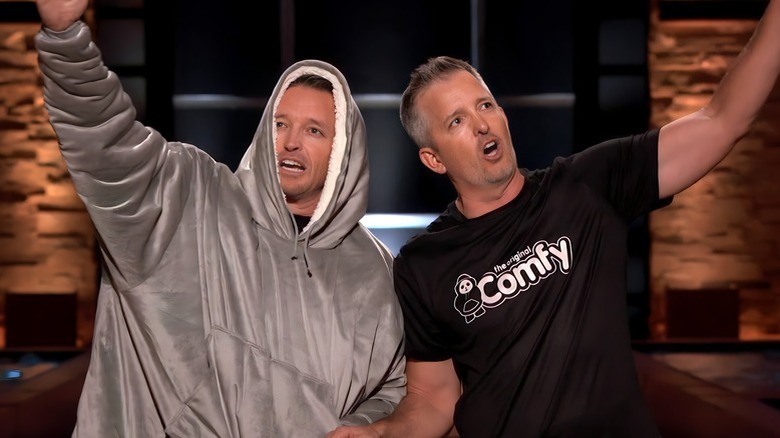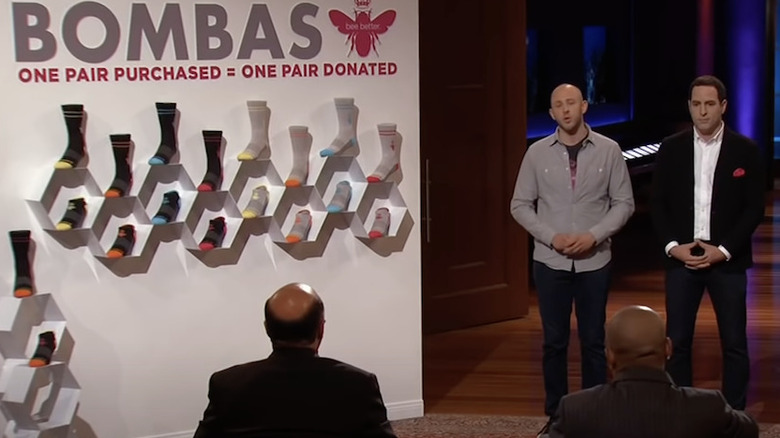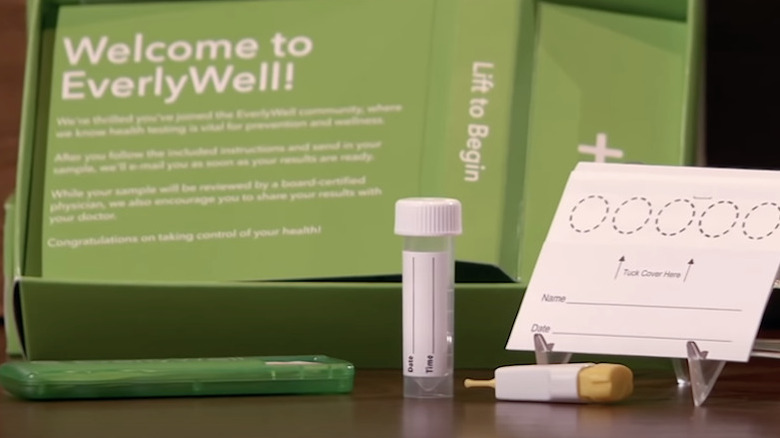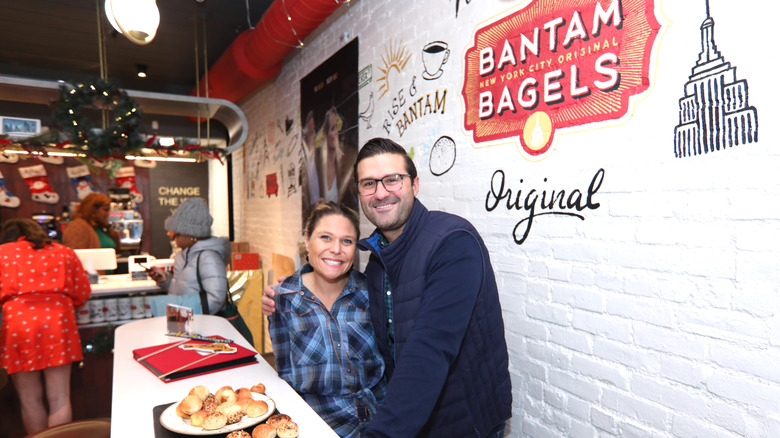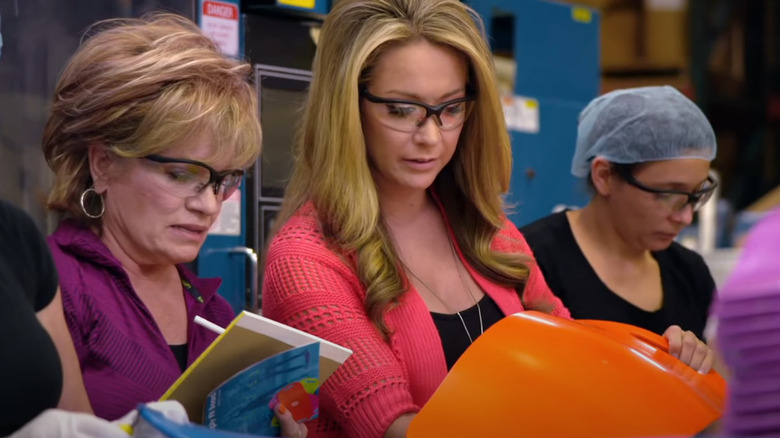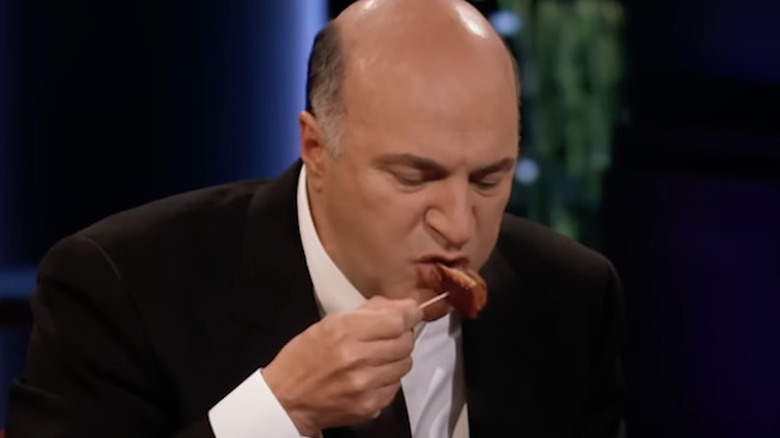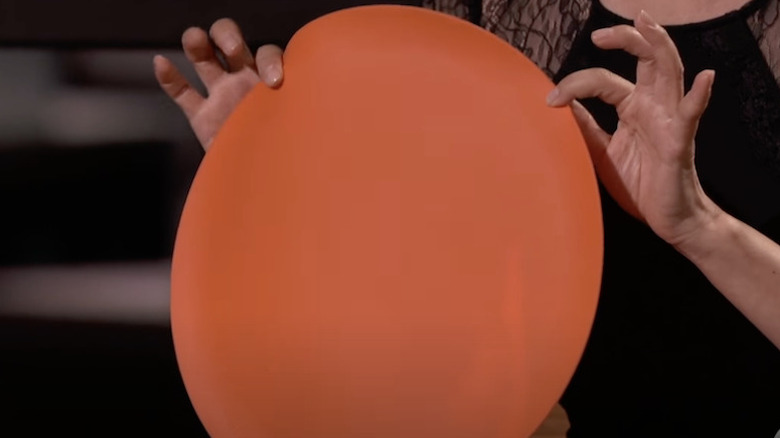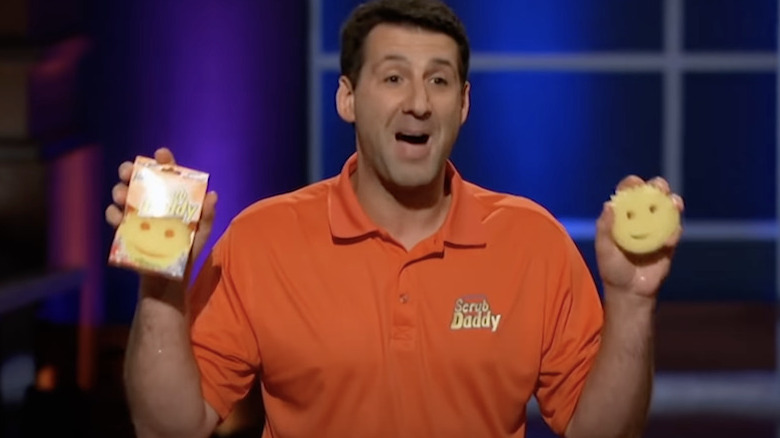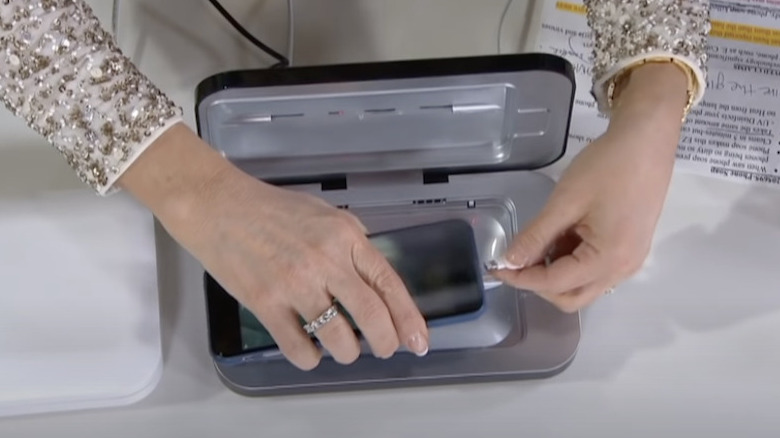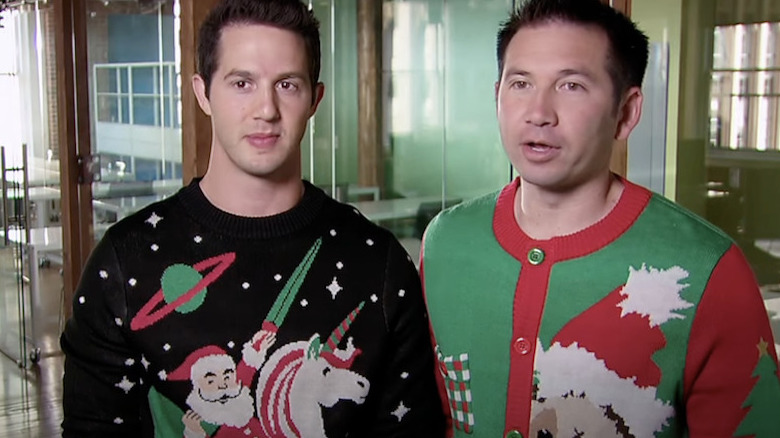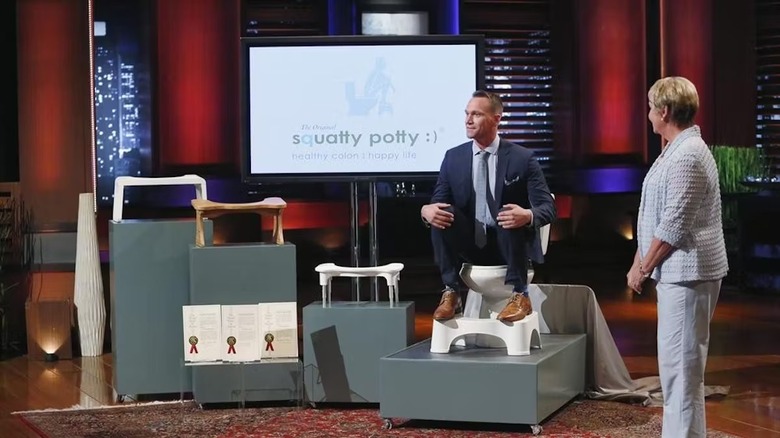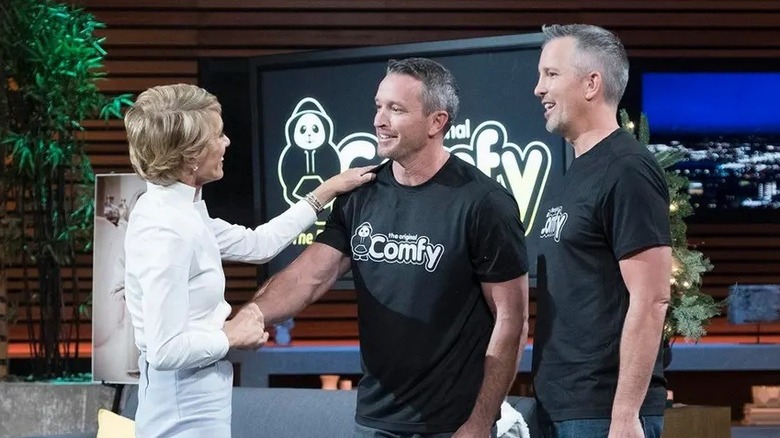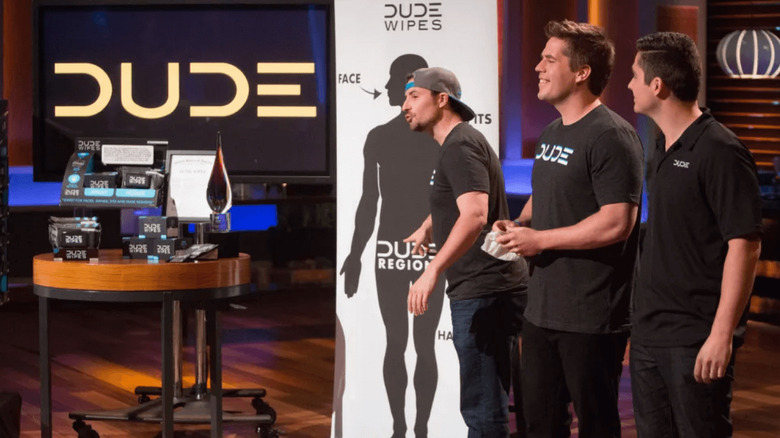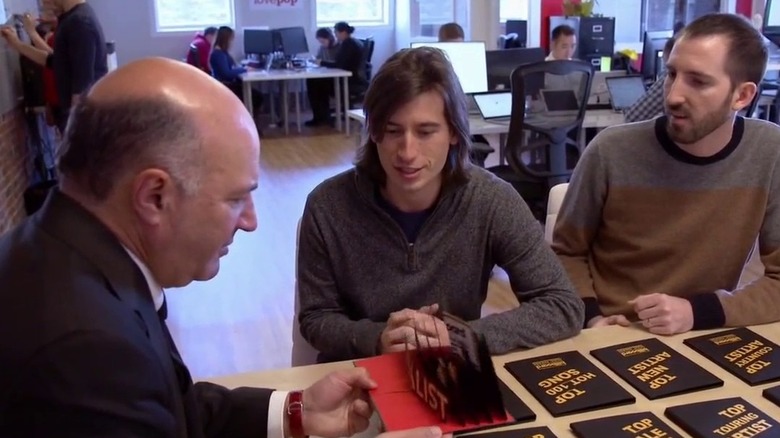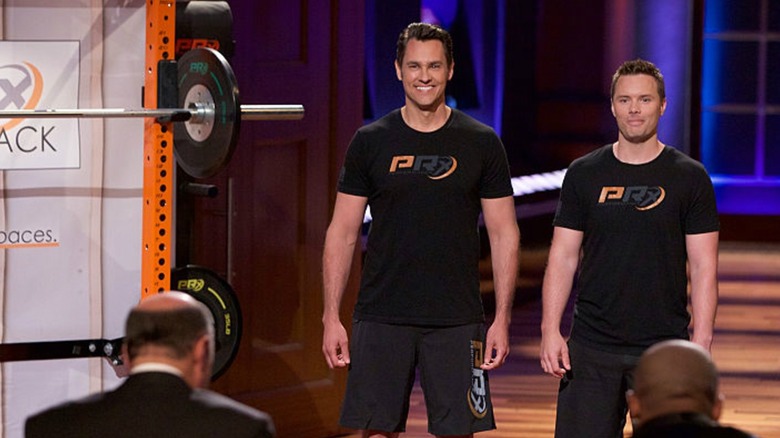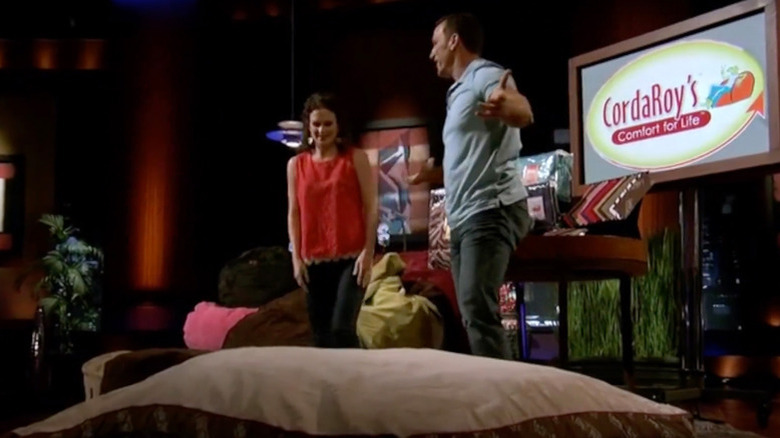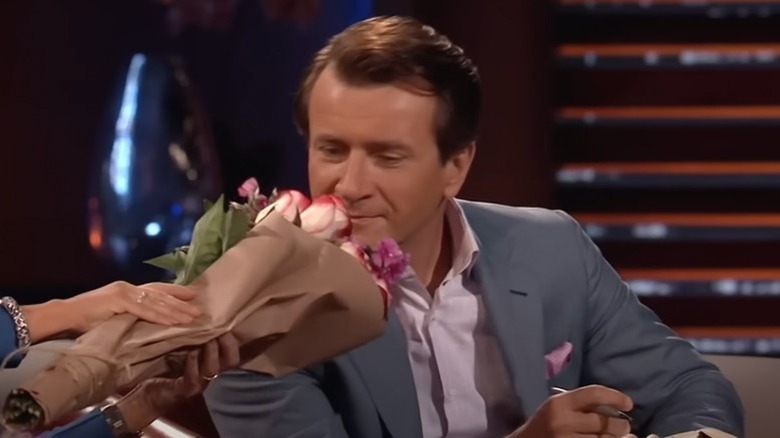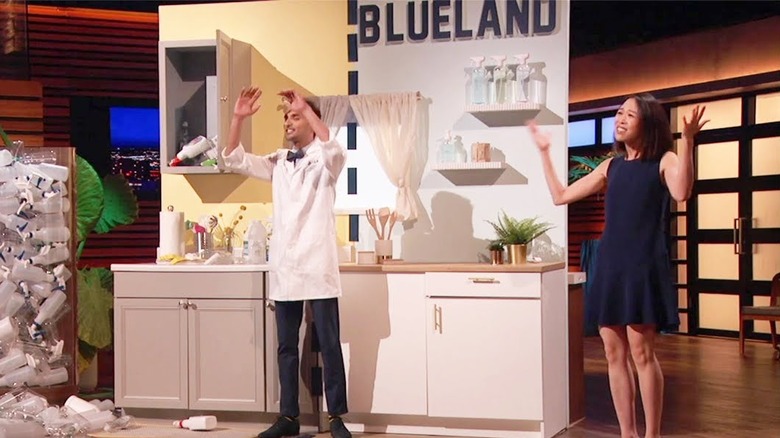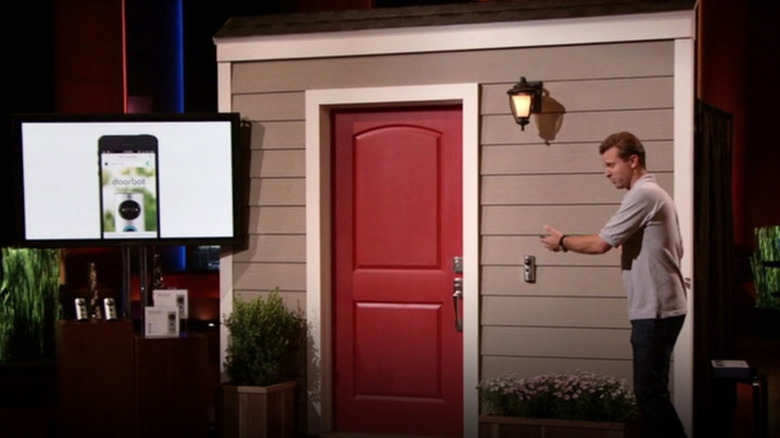Everyday Things You Didn't Know Got Their Start On Shark Tank
This content was paid for by Sony and created by Looper.
One of the best reality TV shows of all time, "Shark Tank" gives inventors and small business owners the chance to pitch their products and ideas to a group of seasoned business moguls. Since the series debuted in 2009, over a thousand entrepreneurs have entered the tank to face off with the Sharks, five angel investors and venture capitalists with a proven track record of success. If all goes according to plan, they'll explain their proposal for their product or service, and at least one of the Sharks will agree to give them the hefty sum they've requested to take their business to the next level in exchange for a moderate equity share of their company.
Hundreds of people with good ideas and good products have emerged from the tank with a much needed lifeline for their business, but only a lucky and industrious handful of those entrepreneurs have experienced the "Shark Tank" dream to its fullest — for their creation to become a household name, fully incorporated into the daily lives of millions. Here are the most famous and important products to emerge from "Shark Tank."
Bombas socks
The sixth season of "Shark Tank" got underway in 2014 in a big way, with what would turn out in the long run to be the biggest revenue-generating product that received financial backing from the long-running investment reality series. All it took to hit big and make that big impact was something almost impossibly soft: next-generation socks (and later T-shirts) made with a fabric blend that allowed smoothness and comfort to come first.
Randy Goldberg and David Heath entered the Tank in search of $200,000 in exchange for a 5% stake in their company, Bombas, a manufacturer of high-quality, eye-catching, and very, very soft socks. Right away, four of the five Sharks passed, and Daymond John was about to do the same until he asked for a 17% cut for his 200 grand. That turned out to be a wise investment for all parties concerned, because by 2021, Bombas had generated sales of $225 million, making it the most lucrative brand in "Shark Tank" history, with consumers ready and willing to shell out for the company's comfortable socks, T-shirts, undergarments, and slippers.
EverlyWell test kits
Until the last decade or so, the idea of food allergies and sensitivities weren't commonly known outside of some individuals' potentially fatal physical aversion to peanuts. But in this era of rapid scientific breakthroughs, technological developments, and widely disseminated information, more and more people have become aware of the negative physical effects they may suffer from different types of food, including wheat and dairy.
This phenomenon has coincided with the rise of easy, affordable at-home medical testing for any number of medical conditions, and a big player in that field is EverlyWell, a company that got a lot of exposure and a generous cash infusion after appearing on "Shark Tank" in 2017. Founded by Julia Cheek in 2015, the company manufactures a big line of at-home medical testing kits that check for food sensitivities, hormone levels, deficiencies, the presence of toxins, and more.
Lori Greiner ponied up the $1 million Cheek sought from "Shark Tank" in the form of a line of credit in exchange for a 5% stake. It paid off: Thanks in part to an at-home COVID-19 test kit, EverlyWell's market valuation sits at around $13 billion.
Bantam Bagels
A traditional European-Jewish baked good with a history dating back centuries, the bagel is now thoroughly entrenched into American cuisine. Spongy but dense on the inside, crispy but light on the outside, bagels are incredibly adaptable and their qualities complement all kinds of toppings and additions, creating a huge market for flavored bagels, bagel sandwiches, microwavable mini-bagel pizzas, and frozen, heat-and-eat bite-size bagels.
One of the most notable, commonly found, and widely consumed bagel-inspired food products is Bantam Bagels. Found in the frozen food section and quickly heated up and easily eaten on the go, they're made up of balls of baked bagel dough. And the cream cheese, usually found atop a sliced and halved bagel? That's stuffed inside.
Bantam Bagels started out as a single bakery in New York City's West Village in 2013, founded by former stockbrokers Nick and Elyse Oleksak. After a lot of media attention spurred business growth, the Oleksaks took their bagels to "Shark Tank" in 2015. After some negotiations, Lori Greiner invested $275,000 in the company for a 25% stake, which paid off big when the Oleksaks sold Bantam Bagels to Lancaster Colony in 2018 for $34 million. Here's more about what happened to Bantam Bagels after "Shark Tank."
The Simply Fit Board
Most anyone who exercises regularly for the sake of physical fitness, improved health, or a fitter appearance does so with an eye toward a flat stomach or toned abdominal muscles. The general marketplace is happy to oblige the millions of consumers in search of the right product that will help them reach that elusive goal with any number of gadgets and pieces of exercise equipment that claim to strengthen, build up, or rework abs. Of the many such products available, one of the top selling and easiest to use is also the simplest, both in conception and construction.
The Simply Fit Board is a thick piece of shaped plastic with a dip in the middle that the user stands on. They must constantly maintain balance while they stand in place and twist their body, back and forth, repeatedly, working their abs and sides as they do so. Invented by mother-daughter team Linda Clark and Gloria Hoffman, the Simply Fit Board appeared on "Shark Tank" in 2015. With $1 million in sales already, Clark and Hoffman asked for a $125,000 investment for a 15% share. Lori Greiner put up the cash and negotiated an 18% share, which certainly made the Shark a lot of money — $160 million worth of Simply Fit products have sold since the "Shark Tank" exposure and deal.
Bubba's Q boneless ribs
It's no accident that "Bubba's Q" sounds a lot like "barbecue." The name firmly links the product to its category, a crowded marketplace, giving it an edge over competitors. Bubba's Q also differs from the other many sauced smoked meats available in that it sells a fully cooked pork product that's already been sauced with the bones removed, making for a much more convenient meal.
Consumers definitely want what Bubba's Q is selling — as of August 2022, the company boasts annual revenues of $5 million worth of boneless ribs. Seeing as how the Bubba's Q restaurant closed in 2019 after 13 years, that's all from sales of packaged ribs, made famous by a spot on "Shark Tank."
In 2013, Al "Bubba" Baker appeared on the financial reality TV show to promote and bolster Bubba's Q Boneless Baby Back Ribs. The former NFL defensive lineman sought a $300,000 cash infusion in exchange for a 15% equity stake. Daymond John offered the sum requested, but negotiated a 30% share, which led to continued growth and attention for Bubba's Q's line of barbecue products.
Silicone mats
Thin, colorful silicone mats are a common kitchen contraption, simply built but effective for a number of uses, be it a jar opening assistant, trivet upon which to place hot dishes, a bowl cover, a splatter guard, a pot holder, or a microwave liner. Just silicone circles have become ubiquitous thanks in part to Safe Grabs, which are sold in multi-packs in an array of colors.
Made of food-grade silicon and free of potentially harmful BPAs, Safe Grabs got a jump on other manufacturers with an appearance by its creator on "Shark Tank" in 2016. Inspired by a lifelong tendency to burn her fingers when taking hot plates right out of the microwave, inventor Cyndi Lee went into the tank seeking $75,000 for a 12% stake in her company. Lori Greiner upped that to a 25% stake, clearing the way for Safe Grabs to cool down kitchens nationwide.
Scrub Daddy
Anybody with a kitchen has to wash their dishes somehow — and they've usually got to have some kind of sponge or scouring thing with which to wash those dishes. As such, millions of people over the last decade have chosen the Scrub Daddy, which got its start on "Shark Tank." Aaron Krause created the 21st century's relatively high-tech answer to the sponge.
He ran a manufacturing operation that left his hands greasy and oily and the only thing that got them clean was a special kind of foam. He developed that substance to a circular object, with two holes in the middle through which he could stick his fingers and clean them. The holes looked like eyes, he added a "smile," and that's how he came up with Scrub Daddy.
They sold okay to begin with, but after failing to gain any attention from big retailers, Krause took Scrub Daddy onto Shark Tank in 2012, where Lori Greiner offered $200,000 for a 20% equity stake. Now available for a few bucks at dozens of stores and outlets, more than 25 million Scrub Daddy products have been sold.
UV smartphone cleaners
By May 2012, smartphones had been widely available for less than half a decade, but they'd already reached critical mass and had become a can't-leave-home-without, can't-live-without, multiple-gadget-replacing, ultimate-accessory of modern life. The downside of all that phone usage is the transmission of germs, bacteria, and viruses — everybody touching their phones hundreds of times a day, after touching countless other things, leaves a lot of nasty microscopic stuff behind on that little touchscreen.
The market showed an opening for smartphone cleaning tools, and Wesley Laporte and Dan Barnes filled that niche with PhoneSoap, a device that charges a phone while also sanitizing and decontaminating it via mess-free UV light rays. The cleaner, and other companies' similar products, reached cultural and retail saturation in the wake of the COVD-19 pandemic, but PhoneSoap was an early entry into the field. Laporte and Barnes pitched their wares on "Shark Tank" in 2012, asking for $300,000, an offer Lori Greiner took, in exchange for a 10% stake in the booming business.
Ugly Christmas sweaters
The winter holiday season is built for traditions, when millions of people celebrate the most wonderful time of the year in the same cherished ways — the eggnog and fruitcake emerge, radio stations switch to an all-Christmas music format, and individuals and offices all over throw casual get-togethers and parties where people are encouraged to dress in holiday attire. In recent years, the "ugly Christmas sweater" has taken over the Christmas clothing niche. These old-fashioned, seemingly homemade garments depict familiar holiday tropes and use common holiday colors to garish, over-the-top effect, forming into something so unattractive that it's fun and kind of pretty.
Tipsy Elves is largely responsible for the "ugly Christmas sweater" fad becoming what it is. Evan Mendelsohn and Nicklaus Morton formed their company right at the cusp of the trend, and presented their line of goofy Christmas clothes on "Shark Tank" in 2013. Already selling sweaters in more than 200 countries by that point, and sponsoring "National Ugly Christmas Sweater Day," Robert Herjavec wrapped up the "Shark Tank" pitch by offering $100,000 for a 10% stake.
The Squatty Potty
The Squatty Potty spawned nothing less than a minor revolution in the intimate and universal act of the way people use a toilet to do their bathroom business. It's an inexpensive, inconspicuous, and portable foot-stool and posture correction device. According to entrepreneurs Bobby and Judy Edwards, biological evidence suggests that human beings are supposed to squat when they evacuate their bowels — and not sit upright or hunched over, the position using a western-style toilet demands.
Going the "wrong" way for so long may lead to poor colon health and painful hemorrhoids. To help those of us who don't want to give up on their in-house thrones, Bobby Edwards invented the very first Squatty Potty, a shaped shelf upon which one rests their feet while using a standard toilet, gently forcing the body into more of a squatting position, and thus putting less strain on their undercarriage and digestive system.
The creators were already well on their way to moving millions of Squatty Potties when they appeared on "Shark Tank" in 2014, asking for $350,000 for a 5% stake. Intrigued by the multi-million-dollar sales figures, Lori Greiner dropped $350,000 for 10% of the company. What happened to Squatty Potty after "Shark Tank" made Greiner's investment look very wise: Its lifetime retail sales now exceed $260 million.
The Comfy
There is no shortage of wearable blankets on the market, from the Snuggie to the Slanket to the various off-brand knockoffs that don't have punny names. But when Brian and Michael Speciale walked onto the "Shark Tank" stage in 2017, they had what they believed to be a truly new — and vastly superior — version of that product for the Sharks to invest in. The Original Comfy was said to be the best of its kind because of the quality of the material, the adjustable hoodie, and the pocket. And, unlike similar products, it was designed to be worn outdoors as well as in the house.
Mark Cuban and Kevin O'Leary were skeptical because the Comfy didn't have any sales yet, but Barbara Corcoran ultimately decided to roll the dice on the product and on the Speciale brothers. Sales were initially very strong, but various misguided business and personnel decisions nearly bankrupted the company just as it was getting going. But Michael Speciale, who ended up buying out Brian's and Barbara's stake in the company in order to go it alone, turned things around. So much so that, by 2023, The Comfy was among the top 10 most successful businesses in "Shark Tank" history.
Dude Wipes
There is a certain kind of man who needs his self-care products specifically marketed with men in mind. And despite the fact that flushable wipes were already an existing product with plenty of different brands and varieties to choose from, none of them were specifically labeled as being for dudes. Enter: Dude Wipes. Knowing that healthy doses of both humor and self-awareness would be essential for selling such a product, Sean Riley, Brian Wilkin, Ryan Meegan, and Jeff Klimkowski came into the tank during Season 7 ready to sell the Sharks on their line of Dude products.
The guys had already done pretty well for themselves on their own, but demand for the product quickly outpaced their limited production capabilities. So they needed an investment from the Sharks to ramp things up and reach the mass market they believed Dude Wipes were capable of reaching. Mark Cuban bought in, matching their cash ask but negotiating a bit more equity than was originally pitched. Considering what happened to Dupe Wipes after "Shark Tank," it was definitely one of Mark's smartest investments – sales increased every year between 2019 and 2024, with an 81% increase just between 2023 and 2024 alone and year-end revenues exceeding $200 million.
Lovepop
After seeing how strongly people reacted to their homemade pop up greeting cards at craft fairs and farmers markets, Wombi Rose and John Wise realized they might have a full-fledged business concept on their hands. They initially grew the business, which they called Lovepop, through two successful Kickstarter campaigns, but they still thought they could reach even higher. So that's where their Season 7 "Shark Tank" pitch came in.
Barbara Corcoran and Lori Greiner didn't see what was so special or unique about the cards, and Mark Cuban didn't like how expensive it was going to be to grow the business to the size it needed to be. Kevin O'Leary was interested, but Robert Herjavec made the first offer. After some back and forth, Lovepop ultimately went with Kevin, who promised to integrate it into his "Something Wonderful" platform of interconnected romance, wedding, and baby shower products. Lovepop eventually got so big that two rivals popped up — Poplife and Paper Love — both of which Lovepop took to court. Even so, Lovepop itself has surpassed $300 million in lifetime sales as of the end of 2024.
PRx Performance
If there is one consumer area that seems especially crowded, it's workout equipment. But that hasn't stopped plenty of entrepreneurs from coming to "Shark Tank" with an idea for some new type of equipment and/or a spin on existing equipment. Two such entrepreneurs were Erik Hopperstad and Brian Brasch, who entered the tank in 2016 with a line of workout equipment called PRx Performance. Their particular spin? The equipment is foldable, mountable, and easy to store away, perfect for people without the space to have workout equipment constantly set up — which is most people.
The duo made a deal with Kevin O'Leary, and the new partners were off and running. Though the rush of sales brought on by the exposure of their episode airing was almost too much to handle, everything ended up working out. In 2019, PRx Performance was in the top five of Inc.'s annual list of fastest-growing companies that year. The company survived the COVID-19 pandemic, as well as losing its main shipping facility to flooding. In 2023, PRx Performance joined the top 15 best-selling "Shark Tank" products ever.
CordaRoy's
Bean bag chairs have come in and out of fashion multiple times since their invention in 1968. But Byron Young's bean bag chairs are different — they can fold out into a bed. His company, CordaRoy's, has actually been in business in some form or another since 1998. Though he wouldn't have come to "Shark Tank" in Season 4 if business was booming. Lori Greiner saw the potential to help CordaRoy's finally become the success that Young always dreamed it could be, and bought in.
Fast forward to today, and CordaRoy's is not only still very much in business, but it has expanded to children's play mats, dog beds, hammocks, blankets, and much more. Despite the company only having a valuation of $345,000 when it entered the tank, the company is now worth millions, no doubt boosted greatly by a deal that saw CordaRoy products made available to buy in Costco stores across the country. Not bad for an investment of only $200,000 from Lori.
The Bouqs Co.
For as much collective experience and success as the Sharks on "Shark Tank" have, they don't always get it right. There have been several examples of everyone passing on a business that went on to become ridiculously successful, including flower delivery service Bouqs. The angle is that Bouqs charges a flat fee for all of its bouquets, no matter what the bouquets contain, and aren't sourced and cut until the day the order is placed. This guarantees the absolute freshest flowers possible at a reasonable price.
The company having an existing investor scared off Mark Cuban. The name scared off Barbara Corcoran. The high valuation scared off Robert Herjavec. And the copyable nature of the business model scared off Lori Greiner. John Tabis, the company's founder, walked off the stage without a deal. However, just because the Sharks don't do a deal that day doesn't mean they never will: When Robert got married, he hired Bouqs to do the flowers, and he was so impressed by how things were handled that he rectified his previous mistake and invested after all. It was a good move on his part, as Bouqs is now worth about $150 million.
Blueland
Plastic pollution is a global problem. Unfortunately, a lot of companies don't seem particularly interested in doing anything about that. Enter Syed Naqvi and Sarah Paiji Yoo, whose company, Blueland, promises a more environmentally friendly approach to cleaning products. When someone purchases one of Blueland's products, they get a bottle that is designed to last forever — when it runs out, you buy a tablet that dissolves in water that refills the bottle, rather than throwing away the old bottle and getting a new one.
Blueland was pitched on "Shark Tank" Season 11 in a fun presentation that took place in a faux kitchen. The Sharks were initially shocked at the fact that the pitch was only offering 2% of the company, and things weren't looking good. At one point, Mark Cuban even accused them of only coming on the show "for the commercial." In the end, after some negotiating, the pair came to a deal with Kevin O'Leary: $270,000 for 3% of the company plus some royalty incentives. As of July 2025, Blueland is estimated to be worth over $13 million, with its products now available in stores like Target and Costco.
Ring
In the history of products that didn't get a deal on "Shark Tank" but went on to become extremely successful anyway, one clearly stands above the rest. That product is DoorBot, the smart doorbell system and camera with an accompanying app. Does DoorBot not sound familiar? Well, that's because after inventor Jamie Siminoff left the tank without a deal, he went back to the drawing board, made some tweaks, and relaunched the product as Ring.
DoorBot already had impressive sales and was about to start being sold at Staples when Siminoff went on "Shark Tank" in 2013, but the Sharks had various misgivings. Kevin O'Leary was the only one who tested the waters, but he countered Siminoff's initial offer. The entrepreneur returned with a counter offer of his own, which Kevin passed on. As such, he left without a deal, but to say he did just fine would be an understatement — in 2018, Amazon purchased Ring for $1 billion. Siminoff would eventually return to "Shark Tank" in 2019 as a guest investor. Interestingly, Mark Cuban has stated that he doesn't regret rejecting Ring.
